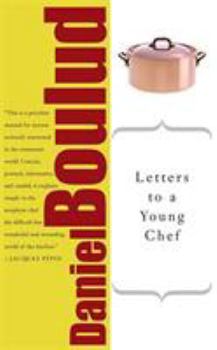Letters to a Young Chef
Select Format
Select Condition 
Book Overview
Daniel Boulud is a pioneer of our contemporary food culture-from the reinvention of French food to the fine dining revolution in America. A modern man with a classical foundation and a lifetime of experience, Boulud speaks with passion about the vocation of creating food. Part memoir, part advice book, part recipe book, this updated edition celebrating of the art of cooking will continue to delight and enlighten all chefs, from passionate amateurs to serious professionals.
Format:Paperback
Language:English
ISBN:0465007775
ISBN13:9780465007776
Release Date:March 2006
Publisher:Basic Books
Length:176 Pages
Weight:0.40 lbs.
Dimensions:0.5" x 5.0" x 8.0"
Customer Reviews
5 ratings
Highly recommended
Published by Thriftbooks.com User , 16 years ago
I highly recommend this book to anyone in the culinary industry or even thinking about becoming a cook. I am a chef and I read this book regularly for motivation.
A culinary student to be...
Published by Thriftbooks.com User , 17 years ago
Daniel is Captivating!!!! He said 30 is not a young chef, I hope that means 26 is still is!
Over 30 Chef
Published by Thriftbooks.com User , 18 years ago
I came late to food (32 years of age), but I had already learned a vast amount of knowledge about food and food service, via working in my Aunt and Uncle's Restaurant in Spain. I then chose to acquire formal "Chef" qualifications, which doesn't really mean anything; at the end of the day, it's all about experience, your passion for food, and your ability to 'teach' yourself everything about food. My other point in regards to age is the British Chef, Nico Ladenis. Here's a man, who took a year off to travel France, came back home to London, started cooking from French Cook Books, worked in his friends Greek Restaurant before opening up his own, and then 20 years later, is the first English Chef to have more than 1 Restaurant awarded with Michelin Star ratings, not to mention that he has had amazing apprentices come out of his kitchens: Marco Pierre White, Gordon Ramsay, etc. I think I would follow passion, drive, professionalism, and love for food and kitchens any day, rather than saying it's all based on what age you come into the kitchen. When you consider that no Chef will ever learn everything about food, everyday is like the first day you walked into a Kitchen. With that attitude and conviction, you can become great! Good luck with your careers.
Good Advice for any professional. Pure gold for Chefs
Published by Thriftbooks.com User , 21 years ago
This essay recommends practices which an aspiring chef of haute cuisine should follow in order to succeed in this very demanding profession. Many of Boulud's recommendations are as applicable to a professional in information systems as they are to a culinary professional, but some are distinctly applicable to crafts where one works with ones hands. For example, one of the things which distinguish professional chefs from the home chef or, for that matter, from culinary journalists, is the fact that they have prepared some dishes thousands of times over, so they can judge the doneness of a cooked material by the simplest sound or feel or smell. They are so well practiced at knife skills that many kitchen aids are, for them a waste of time. So, there are some suggestions which may actually be better advice for a carpenter than they are for a statistician.The recommendations are golden. I find nothing here which runs counter to anything else I have read about the culinary profession. Two of the most distinctive aspects are the importance of mentoring in a culinary education and the need to be prepared to give up a normal life at home. The first aspect repeats the similarity between culinary arts and other manual trades. Carpentry and plumbing still follow mentoring career paths dating back to the middle ages.Boulud also effectively describes the difference between haute cuisine and bourgoise cuisine, a distinction in French which I have seen in no other cuisine, although I suspect there are some Japanese culinary disciplines which embody the same distinctions with their intensive discipline in knife skills and pasta making. One hallmark of haute cuisine is that it is very common to have two or more ingredients or preparations cooked separately so each is heated to just the right degree of doneness for that material. When I started cooking, this aspect always annoyed me and made me wonder why recipes weren't written more simply. This attitude shows an ignorance of or lack of respect for different ingredients.The only objection I have to this book is it's price. A list price of $22.50 for 124 small pages is a bit much, even for the high quality of the material within. I subtracted the 35 pages of recipes in the back, as I believe many of them have appeared in some of Boulud's other books.Otherwise, this is a must read for anyone interested in the culinary arts, especially if you have not already read widely in the literature on the subject.
not only a must read for all future chefs...
Published by Thriftbooks.com User , 21 years ago
this easy to read book is fascinating for all interested in fine cuisine, not only for aspiring chefs. it gives a description of all the different skills needed to become a successful cook (and maybe restaurant owner), and the author makes clear that being very successful in his profession is not a miracle, but only hard work for many, many years and 100% dedication will lead to it. this book should be mandatory reading for all future chefs so that they can fully understand what to expect, and not choose a career they later regret. for patrons of fine restaurants it offers a fascinating insight into the intricacies of such an organization and its staff.





